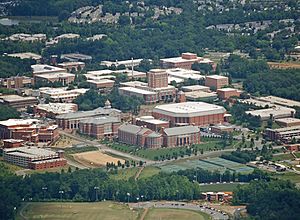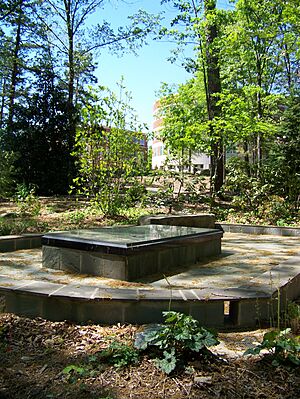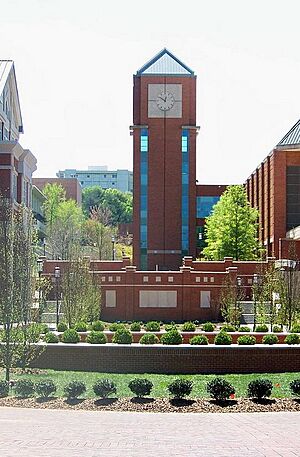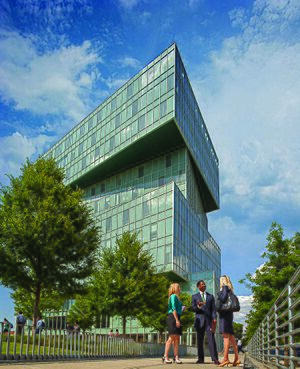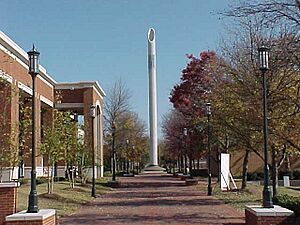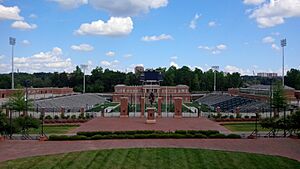University of North Carolina at Charlotte facts for kids
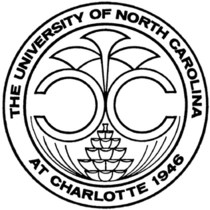 |
|
|
Former names
|
Charlotte Center of the University of North Carolina (1946–1949) Charlotte College (1949–1965) |
|---|---|
| Type | Public research university |
| Established | September 23, 1946 |
|
Parent institution
|
University of North Carolina |
| Accreditation | SACS |
|
Academic affiliations
|
|
| Endowment | $344.5 million (2024) |
| Chancellor | Sharon Gaber |
| Provost | Jennifer Troyer |
|
Academic staff
|
1,553 (fall 2023) |
| Students | 31,091 (fall 2024) |
| Undergraduates | 24,868 (fall 2024) |
| Postgraduates | 6,223 (fall 2024) |
| Location |
University City, Charlotte
,
North Carolina
,
United States
35°18′23″N 80°44′00″W / 35.30639°N 80.73333°W |
| Campus | Large city, 1,000 acres (4.0 km2) |
| Newspaper | Niner Times |
| Colors | Green, white and gold |
| Nickname | 49ers |
|
Sporting affiliations
|
NCAA Division I FBS – The American |
| Mascot | Norm the Niner |
 |
|
The University of North Carolina at Charlotte (often called UNC Charlotte or just Charlotte) is a large public university in Charlotte, North Carolina, United States. It's a place where students can study many different subjects. UNC Charlotte offers 24 programs for doctoral degrees, 66 for master's degrees, and 79 for bachelor's degrees. These are offered through its nine colleges. The university is known for its high level of research and for awarding many doctoral degrees.
The number of students at UNC Charlotte grew very quickly in the late 2000s and early 2010s. During that time, it was the fastest-growing school in the entire UNC System.
The university has two main locations. The Main Campus is in University City. The Center City Campus is in Uptown Charlotte. The main campus is huge, covering 1,000 acres (about 4 square kilometers) with around 85 buildings. It's about 8 miles (13 km) from Uptown Charlotte.
Contents
History of UNC Charlotte
For a long time, the city of Charlotte wanted its own public university. In 1946, after World War II, many soldiers were returning home and wanted to go to college. To help with this, the University of North Carolina opened 12 "extension centers" across North Carolina.
On September 23, 1946, the Charlotte Center of the University of North Carolina opened. It started with 278 students. The local school system managed the center, and Charles Bernard was its first director. Classes were held at night at Central High School in Uptown Charlotte. At first, only first-year courses were offered, but second-year courses were added in 1947. That same year, a math teacher named Bonnie Ethel Cone became the new director.
By 1948, only four extension centers were still open. The University of North Carolina decided to close the remaining centers in 1949. However, thanks to efforts led by Bonnie Cone, the state created the Charlotte Community College System on April 4, 1949. This system included two schools: Charlotte College for white students and Carver College for black students. In 1950, Charlotte College became a "standard junior college," meaning students could transfer their credits to four-year colleges.
Bonnie Cone continued to lead Charlotte College. In 1954, the school became racially desegregated because of a U.S. Supreme Court case. By 1957, the number of students grew to 492. The college leaders then looked for a permanent place for the campus. They chose a 250-acre (1 square kilometer) area northeast of the city. The college became state-supported in 1958 and moved to its current location in 1961. It added a third year of study in 1963 and a fourth year in 1964.
On March 3, 1965, the state officially made Charlotte College the fourth campus of the University of North Carolina. It was renamed the University of North Carolina at Charlotte. On May 29, 1966, 81 students became the first to graduate from the school as part of the UNC system. In 1969, the university opened its first dorm, housing about 600 students. That same year, it started offering master's degree programs. The first master's degree was given out in May 1970. By 1973, the number of students had grown to 6,123.
In 1992, UNC Charlotte was allowed to offer programs for doctoral degrees.
University Leaders
| Order | Chancellor | Years as Chancellor |
|---|---|---|
| 1 | Bonnie Ethel Cone | (Founder; Director, 1947–1961; President, 1961–1965; Acting Chancellor, 1965–1966; Vice-Chancellor Emeritus & Dean of Religious Studies, 1973–2003) |
| 2 | Dean W. Colvard | (1966–1978) |
| 3 | E.K. Fretwell | (1979–1989) |
| 4 | James H. Woodward | (1989–2005) |
| 5 | Philip L. Dubois | (2005–2020) |
| 6 | Sharon Gaber | (2020–present) |
Bonnie Ethel Cone: The Founder
Bonnie Ethel Cone (1907–2003), often called Miss Bonnie, was a very important person in the university's history. She became the director of the Charlotte Center in 1947. From 1949 to 1965, she was the president of Charlotte College. When Charlotte College joined the UNC system in 1965, Cone served as the acting chancellor until 1966.
Chancellors of UNC Charlotte
Dean W. Colvard (1913–2007) was the first official chancellor of the university, starting in 1966. He helped turn the school from a small college into a four-year university. He oversaw the university getting its official accreditation, helped create the University Research Park, built the first dorms, started the first graduate programs, and saw student numbers grow from about 1,700 to over 8,000. The Colvard building on campus is named after him.
E.K. Fretwell (1923–2012) became the second chancellor in 1979. Under his leadership, student enrollment jumped from 8,000 to over 12,000. He helped create the Graduate School and added more graduate degrees. He also helped connect the library's card catalog to the internet in 1983. The Fretwell building is named in his honor.
James H. Woodward took over as chancellor in 1989. During his time, student numbers grew to over 19,000. He continued to expand the Graduate School and added new doctoral programs. He also led the biggest fundraising effort and building boom in the school's history. Woodward Hall, which houses the College of Computing & Informatics, is named after him.
Philip L. Dubois was the fifth leader and fourth chancellor, starting in 2005. He had worked at UNC Charlotte before as a provost. His goal was to help the university become one of the top research universities in the state.
In 2019, an event occurred in a campus building. Two people lost their lives, and four others were injured.
Campuses
Main Campus – University City
The Main Campus is almost 1,000 acres (4 square kilometers) of land. It's about 10 miles (16 km) from Uptown Charlotte. No major roads cut through the campus, making it feel like its own community. The campus has several man-made lakes and lots of trees. There are also two gardens that many visitors enjoy each year.
The older buildings on campus were built in the 1960s and 1970s and look very practical. Since 2014, these buildings have been updated. Newer buildings are made of brick and have a more classic look. Sidewalks are being changed from concrete to brick, and the campus roads are getting more trees and landscaping.
Center City Campus
The second campus, called the Dubois Center at UNC Charlotte Center City, is in Uptown Charlotte. This campus is home to the School of Professional Studies and 23 other academic programs. It moved into a new 12-story building on August 22, 2011. The building is close to the light rail station, making it easy for students to get there. The building's design looks like a stack of books.
Getting Around Campus
Charlotte Area Transit System (CATS)
All UNC Charlotte students get a special pass for the Charlotte Area Transit System (CATS). This pass lets them ride all CATS buses and trains for free.
Light Rail
The Lynx Blue Line light rail was added to UNC Charlotte's campus in 2018. It connects students to 25 other stations, including the Charlotte Transportation Center in Uptown. From there, students can switch to other buses or the airport shuttle.
CATS Buses
CATS also has bus routes that serve UNC Charlotte. As of August 2025, there are two bus routes. Route 29 stops at different places on campus, and Route 22 stops near the Engineering campus.
Niner Transit
On campus, students can ride one of six bus routes. The Green, Silver, Red Express, and Gold routes run daily. The Greek Village and Shopping Shuttles run on certain days. The university also has a special service called Niner Rides for students who need prearranged rides.
| Route | Station | ||
|---|---|---|---|
| Green | Light Rail | ↔ | North Deck |
| Silver | CRI Deck | ↔ | PORTAL |
| Red Express | Student Union East | ↔ | Football Stadium/Gate 1 |
| Gold | Wallis Hall | ↔ | Student Union Deck |
| Greek Village Shuttle | Student Union West | ↔ | Student Union West |
| Shopping Shuttle | Levine Hall | ↔ | Harris Teeter |
| Niner Paratransit | Prearranged Service (54 stops) |
||
Students at UNC Charlotte
| Race and ethnicity | Total | ||
|---|---|---|---|
| White | 55% |
|
|
| Black | 16% |
|
|
| Hispanic | 12% |
|
|
| Asian | 9% |
|
|
| Other | 7% |
|
|
| Foreign national | 2% |
|
|
| Economic diversity | |||
| Low-income | 31% |
|
|
| Affluent | 69% |
|
|
In the fall of 2024, about 31,091 students were enrolled at the university. These students come from almost all of North Carolina's counties, 49 states, and 99 different countries.
Academics at UNC Charlotte
UNC Charlotte is known as an "R1" university, which means it does a lot of research and awards many doctoral degrees. In the 2025 U.S. News & World Report Best Colleges rankings, the university's undergraduate program was ranked 152nd among national universities. Forbes magazine placed the university at 225th out of 500 nationwide.
| THES World | 601-800 |
|---|---|
| USNWR National University | 152 from 436 |
| Washington Monthly National University | 140 from 438 |
| Forbes | 225 from 500 |
| USNWR | Rank |
|---|---|
| Engineering (undergraduate) | 137 |
| Social Mobility | 63 |
| Education (online Masters) | 23 |
| Curriculum & Instruction (online Masters) | 17 |
| Instructional Media (online Masters) | 13 |
| Special Education (online Masters) | 10 |
| Best Online Bachelors | 4 |
| Engineering (online Masters) | 62 |
| Nursing (online Masters) | 37 |
| Nursing Education (online Masters) | 11 |
| Part-Time MBA | 69 |
| Education-Masters | 76 |
| Engineering-Masters | 152 |
| Nursing-Masters | 95 |
| Nursing-Doctorate | 110 |
| Biological Sciences | 175 |
| Clinical Psychology | 88 |
| Computer Science | 99 |
| Healthcare Management | 43 |
| Mathematics | 115 |
| Nursing-Anesthesia | 36 |
| Physics | 122 |
| Public Affairs | 49 |
| Local Government Management | 22 |
| Public Health | 70 |
| Social Work | 72 |
| Statistics | 70 |
Colleges and Study Programs
The university offers 171 main study areas. These lead to 79 bachelor's degrees, 66 master's degree programs, and 24 doctoral programs. Some programs can be taken partly or fully online.
The university is divided into ten colleges:
- College of Humanities & Earth and Social Sciences: This college covers subjects like history, writing, and how people interact in society.
- Klein College of Science: This college focuses on math and natural sciences like biology and chemistry.
- College of Arts + Architecture: Here, students can study art, theater, dance, music, and architecture.
- Cato College of Education: This is where students learn to become teachers.
- College of Health and Human Services: This college includes social work, exercise science, and nursing.
- William States Lee College of Engineering: This college offers many engineering programs, like civil, mechanical, and computer engineering.
- College of Computing and Informatics: This college teaches computer science, programming, and how to use computers in health and biology. It's the largest computing college in North Carolina.
- Belk College of Business: This is the business school. It offers degrees in accounting, marketing, finance, and more. It was named after the Belk family in 1990.
- University College: This college helps undergraduate students who haven't decided on a major yet.
- Honors College: This is a special program for high-achieving students who want a more in-depth learning experience.
- Graduate School: This school works with the other colleges to organize master's and doctoral degree programs.
Scholarships for Students
In 2009, UNC Charlotte received its largest single gift from a private source. The Leon Levine Family Foundation gave $9.3 million to start the Levine Scholars program. This scholarship, named for Leon and Sandra Levine, provides a four-year scholarship to UNC Charlotte. It covers tuition, fees, books, housing, four summer experiences, and money for community service projects.
Besides the Levine Scholars, the university offers eleven other scholarships based on student achievements.
University Library System
UNC Charlotte's J. Murrey Atkins Library is named after the first chairman of the Charlotte College Board of Trustees. It has over 3.3 million books, including 930,000 e-books. It also has over 400 databases and about 75,000 journals, most of which are available online. The library was recently updated and has a ten-story tower. In 2007, the library received its one-millionth book. A special collections area is on the tenth floor.
Sports at UNC Charlotte
The university's sports teams are called the 49ers. This nickname comes from the year 1949, when Charlotte College was saved from closing. The mascot is "Norm the Niner," who looks like a gold miner. The school colors are green and white, with gold and black also used in logos and uniforms.
For sports, the school is simply known as "Charlotte." The athletic department has nineteen varsity teams and competes in NCAA Division I. Since the 2022-23 school year, the university has been a full member of the American Athletic Conference. In 2008, the university decided to add a football program.
Men's Basketball
The men's basketball team has been to the NCAA Tournament 11 times. They even made it to the Final Four in 1977. Some players from the 49ers have gone on to play in the NBA.
Women's Basketball
In 2003, the women's basketball team reached the NCAA Tournament for the first time. In the 2021–22 season, they won both their conference's regular season and tournament championships, earning another trip to the NCAA tournament.
Baseball
Charlotte Baseball has been in the NCAA Tournament six times, most recently in 2021. They have won four conference tournament championships and eight regular season conference championships. Some baseball players from Charlotte have played in Major League Baseball.
Football
Charlotte's football team started playing in 2013. They play at Jerry Richardson Stadium, which can hold about 15,000 people and can be made larger. Their first game was a big win against Campbell University on August 31, 2013.
The football program moved up to Division I FBS in 2015 and joined Conference USA. The Charlotte 49ers played in their first bowl game in 2019. They moved to the American Athletic Conference starting in 2023. Several Charlotte players have been chosen in the NFL Draft.
Men's Golf
In September 2007, the Charlotte men's golf team was ranked as the top golf team in the nation.
Men's Soccer
The men's soccer team reached the College Cup in 1996 and 2011. In 2011, they made it all the way to the championship game, finishing second nationally. Some former 49ers soccer players have gone on to play in Major League Soccer (MLS).
The team has won eight conference titles, including two recent ones in 2023-2024 and 2024-2025 as part of the American Athletic Conference.
Track and Field
Both the men's and women's track and field teams have competed nationally. One of their most famous athletes is Shareese Woods, who ran professionally.
Volleyball
The women's volleyball team is a big supporter of the "Dig Pink" event, which raises awareness for breast cancer.
Student Groups
There are many student organizations at the university. These groups focus on academics, honors, international interests, different cultures, politics, religion, community service, and sports. UNC Charlotte also has many sororities and fraternities.
Famous Alumni and Faculty
Every person who graduates from UNC Charlotte automatically becomes a member of the Alumni Association. This group has over 147,000 former students. Its main goal is to help the university. There are no fees to join, but members are encouraged to be active. The association helps graduates connect with each other and celebrates their achievements. It also shares news from the university and the association. To stay a member, alumni just need to keep their contact information updated with the university.
See also
 In Spanish: Universidad de Carolina del Norte en Charlotte para niños
In Spanish: Universidad de Carolina del Norte en Charlotte para niños
- Dale F. Halton Arena
- Lee Rose
- Jeff Mullins
- Bobby Lutz
 | DeHart Hubbard |
 | Wilma Rudolph |
 | Jesse Owens |
 | Jackie Joyner-Kersee |
 | Major Taylor |


